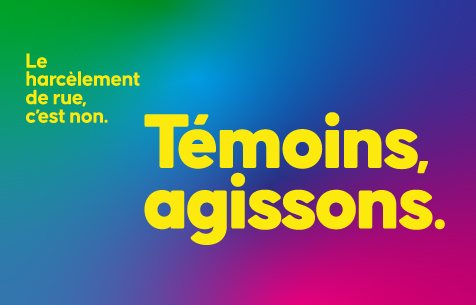City of Montréal, SPVM and STM join forces to denounce street harassment

12 june 2023
Recognizing the need to take action and denounce street harassment with a strong, united voice, the City of Montréal, the Service de police de la Ville de Montréal (SPVM) and the Société de transport de Montréal (STM) launched today the new campaign, “Street harassment: stop it. Witnesses, take action.” The initiative aims to acknowledge the existence of street harassment, denounce it, make the public aware of their role as potential witnesses, and give people specific things they can do should they witness an act of street harassment. Planned actions include a poster campaign, a microsite, www.temoinsagissons.ca, and internal initiatives.
Defining street harassment
Some incidents of street harassment may involve criminal acts, while others may not. According to a 2022 study by Courcy et al., “street harassment is part of a spectrum of violence that includes so-called ‘everyday’ or downplayed forms of violence, as well as criminalized behaviours and statements that may have sexist, racist, cissexist, heterosexist, classist, ageist and ableist connotations. It includes any statement, attitude or behaviour that is demanding and unwanted and is perpetrated by strangers in public spaces, such as parks, bus stops, metro networks, bars and museums.”[1]
A multifaceted campaign
- The poster campaign will be active for five weeks, with content featuring a clean, bold, colourful visual identity. Various versions will be posted in public spaces, STM facilities and digital media placements.
- The newly launched microsite (www.witnessestakeaction.ca) aims to define street harassment, provide tools and support for those who have been targeted, inform witnesses of what to do, and offer resources for further action.
- The STM-led internal initiative aims to empower front-line and customer service staff to respond to targets of street harassment with empathy and offer referrals to help and support resources, such as Tel-Jeunes, Interligne and the Sexual Violence Helpline. Employees will also receive a new resource card that can be handed out to facilitate referrals.
- Signage will be posted in libraries and other community, cultural and sports facilities in all 19 boroughs.
- In the medium term, five awareness-raising videos on the five things witnesses can do will be posted online, and workshops will be held in public spaces to promote awareness and education on how to be an active witness (spring and summer 2024).
Partner quotes
“As a member of the UN Women’s Safe Cities and Safe Public Spaces network, the City of Montréal is committed to prioritizing the prevention of gender-based violence and all other forms of violence in public spaces. Whether young or old, all Montrealers have the right to thrive in public spaces that are safe, respectful of differences and free from discriminatory behaviour. Too often downplayed, street harassment is unacceptable and must be fought fiercely. Through this campaign, we are emphasizing the importance of raising awareness and empowering people not only to recognize unacceptable behaviour in the public sphere but also to do something about it as active witnesses. Together, we can make all the difference and create caring, supportive communities.” — Despina Sourias, Associate Councillor for the status of women, diversity, youth and seniors on the Executive Committee of the City of Montréal.
“The impact of street harassment should not be underestimated. This campaign is important because it allows us to join forces to denounce and prevent it. Unacceptable actions that compromise our well-being in public spaces must not be downplayed or go unmentioned. If ever you either witness or experience street harassment, please do not hesitate to report it the moment it makes you feel unsafe. The police officers of the SPVM are there to help you.” — Anouk St-Onge of the SPVM urban security and prevention investigations unit.
“It is essential that all our customers feel safe in the STM network, and we know that for some people, street harassment can be a barrier to using public transit. Our goal in fighting this problem is to make our services accessible and appealing to all. We decided to act as a catalyst to bring the City and the SPVM together to lead this campaign, because we believe that this critical social issue requires multiple voices to raise awareness, provide concrete tools and truly reach the people of Montréal, including our customers and employees.” — Marie-Claude Léonard, CEO of the STM
From commitment to action
The STM and the SPVM have both signed onto the declaration adopted by the City of Montréal on October 24, 2022, to reinforce the fight against street harassment in Montréal. It is a far-reaching process that we are undertaking with openness, humility and a desire to listen to the needs of the community. The “Street harassment: stop it. Witnesses, take action” campaign and resulting actions represent the participating organizations’ commitment to joining the fight against street harassment by finding new ways to combat it and putting them into action. The current efforts to combat street harassment in Montréal owe their existence to feminist activism, such as that of the Centre d’éducation et d’action des femmes de Montréal (CÉAF), as well as to the work of researchers and the Conseil des Montréalaises on the safety of women and girls in public spaces. The content and messages of this campaign were developed in collaboration with various local organizations to better account for the specific experiences of many people in Montréal’s public spaces.



